Tunisian organic olive oil
A far-reaching and promising future. There are currently some 3 300 operators in the vari- ous branches. Olive oil continues to dominate the market, for which Tunisia was the first global exporter of organic olive oil in 2015. Olive growing is the driving force of organic farming in Tunisia, where olive plantations cover some 125 000 ha, or 40% of the total crop area using organic farming practices, thereby to position itself as the third country in terms of olive acreage
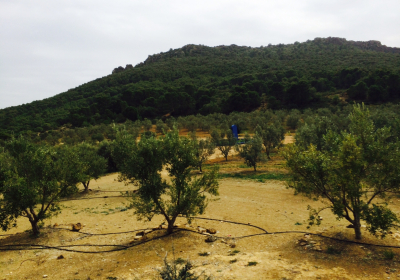
Tunisian organic farming is on the rise and has reached a level of maturity that would allow it to take up a better international standing and enter new mar- kets, thereby promoting Tunisia as an economic and touristic destination known for its organic crops.
Organic farming is an up-and-coming sector. With land stretching over 500 000 ha, Tunisia is the second country in Africa after Uganda in terms of land used for organic farming. Its annual production is of approxi- mately 450 000 tonnes for all products.
A strategy has been established for the 2020 target five-year plan (2015 – 20) for the development of the organic farming sector. It is based on some twenty branches producing a large variety of products that enable Tunisia to claim that it is the home of organic farming.
There are currently some 3 300 operators in the vari- ous branches of organic farming, and Tunisia exports 50 000 tonnes of organic products to 60 destinations every year, for an estimated value of 350 million dinars.
The export of Tunisian organic products has con- siderably increased over the last ten years, rising from approximately 5 000 tonnes in 2002 to almost 50 000 tonnes in 2016.
Olive oil continues to dominate the market, for which Tunisia was the first global exporter of organic olive oil in 2015.
In the 2000s there was a worldwide growth in de- mand for organic products, especially in Europe. This provided Tunisia with the opportunity to bring olive tree crops under organic farming. A national policy has therefore been developed to organise this sector with a view to increasing exports of Tunisian products, which currently account for only 1% of the global organic market.
Olive growing is the driving force of organic farming in Tunisia, where olive plantations cover some 125 000 ha, or 40% of the total crop area using organic farming practices, thereby allowing Tunisia to position itself as the third country in terms of olive acreage.
Trends in the volumes of organic olive oil exports have behaved as follows:
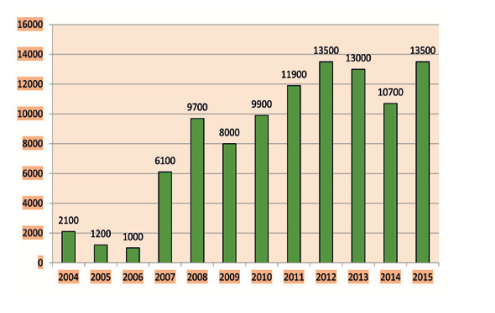
The actors in the organic farming sector include the Technical Centre for Organic Farming, which plays a central role in supervision, assistance and promotion.
The Technical Centre for Organic Farming
The Technical Centre for Organic Farming (CTAB) was created under Act No 96-04 of 19 January 1996, concerning technical centres in the agricultural sector and the ruling of the Ministry of Agriculture of 2 Octo- ber 1999, concerning the creation of the CTAB and the approval of its legal status.
Mission:
– Ensuring that the results of research are in line with the real conditions in agriculture;
– Conducting programmes for the application of the results of research;
– Conducting popularisation activities to enable the rapid and effective transfer of technical progress;
– Organising the dissemination of more effective production techniques with a view to ensuring an optimised use of the data and technical knowledge acquired;
– Supporting agricultural development through training, re-training and skill upgrades;
– Providing producers with technical and economic assistance;
– Developing exchanges with institutions withsimilar or the same national or foreign interests, and with international organisations;
– Conducting studies and collecting scientific and technical information on the sector for dissemina- tion among users;
– Proposing research subjects specific to organic farming to teaching and research establishments;
– Establishing maps setting out the regions that are most favourable for organic farming;
– Working towards the development of techniques specific to the production of organic matter, breed- ing insects used in biological control and develop- ing specific processing equipment;
– Adapting technical innovations specific to organic farming with a view to generalising their use;
– Participating in the preservation of species and genetic plant heritage.
– Partecipating in experiments for the standardisation and registrations of organic input (fertiliser, pesticdes, etc.) and the update of the list of inputs authorised in organic farming;
– Participating in training young promoters in the organic farming sector and providing assistance for students in various higher agricultural education institutions.
Integrated quality, security and environment certification « QSE » of the CTAB
On 28 February 2013, the CTAB obtained the inte- grated “QSE” certificate. It is the first public body in Tunisia to obtain this type of integrated certificate. It includes certification according to the international standard for quality management systems “ISO9001: 2008” and the British standard BS OHSAS 18001 “Brit- ish Standard Occupational Health and Safety Assess- ment Series”, which is a model occupational health and safety management system.
Verification and certification
In order to certify that a product comes from or- ganic farming, operators must undergo monitoring by a verification and certification body accredited by the Ministry of Agriculture in the area of organic farming according to Act No 99-33 of 5 April 1999, Decree No 2000-409 of 14 February 2000 and Decree No 2012– 2819 of 20 November 2012, establishing the conditions for recognition and the procedures for verification and certification.
The accredited verification and certification bodies in Tunisia are:
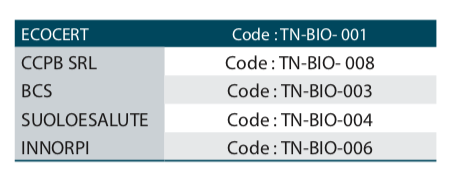
The organic logo
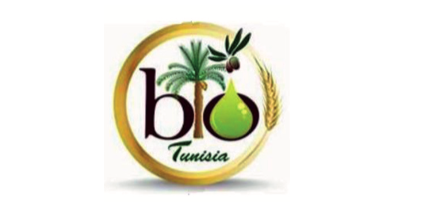
In order to promote organic products nationally and internationally, an optional and free Tunisian logo was created. To use it, the product must be certified by a verification and certification body in accordance with the Tunisian regulations in force.
This logo is awarded following a request from the in- terested party, using an agreed model and accompanied by the certificate of conformity awarded by the verifica- tion body, proving that the product is obtained accord- ing to the rules of organic farming, which are deposited with the relevant department of the regional authority for agricultural development or with the Directorate General for Organic Farming, which proceeds to examine it over a period not exceeding one month following the deposit.
It is important to note that the applicant is required to transmit the labels used, and any draft changes to them, to the Directorate General for Organic Farming of the Ministry of Agriculture.
Should the application be accepted, the logo is awarded by a decision of the Ministry of Agriculture, accompanied by a document indicating the position of the logo, its dimensions, colours, shape and all the rules that are to be respected for its use, according to the ma- terials used to this end. This logo is then registered by the Ministry of Agriculture at the National Institute of Standardisation and Intellectual Property.
The 24 organic olive oil exporters are distributed over the regions as follows: 25% in the Sahel, 50% in Sfax, 20% in the north, 4% in the centre and 1% in the south. Organic producers are spread across the terri- tory as follows:
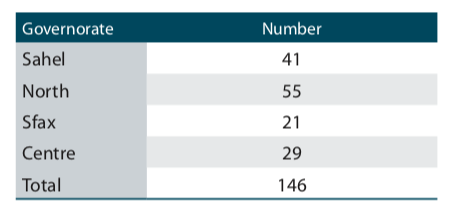
Source: Olivae, No 124
Photo by Luigi Caricato
To comment you have to register
If you're already registered you can click here to access your account
or click here to create a new account

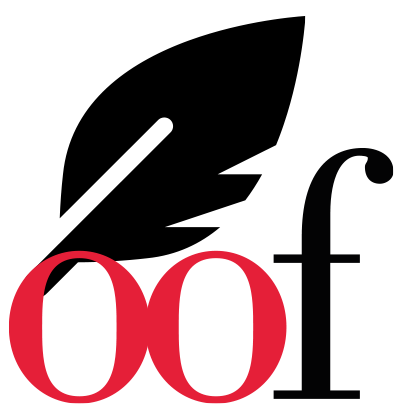
Comment this news